Premixed Combustion Eddy Dissipation CFD Simulation
$140.00 $70.00 Student Discount
- The problem numerically simulates the Premixed Combustion in a combustion chamber using ANSYS Fluent software.
- We design the 2-D model with the Design Modeler software.
- We mesh the model with ANSYS Meshing software.
- The mesh type is Structured, and the element number equals 86002.
- We use the Species Transport model to define a Combustion reaction.
- We use the Eddy Dissipation for turbulence-chemistry interaction.
To Order Your Project or benefit from a CFD consultation, contact our experts via email (info@mr-cfd.com), online support tab, or WhatsApp at +44 7443 197273.
There are some Free Products to check our service quality.
If you want the training video in another language instead of English, ask it via info@mr-cfd.com after you buy the product.
Description
Premixed Combustion, Species Transport, Eddy Dissipation, ANSYS Fluent CFD Training
The present problem simulates the premixed combustion in a combustion chamber by ANSYS Fluent software. In the present case, it is assumed that the fuel and air enter the chamber from one boundary and are considered premixed.
The geometry of the present model is two-dimensional and has been designed using Design Modeler software. We do the meshing of the present model with ANSYS Meshing software. The mesh type is Structured, and the element number is 86,002.
This CFD project is the 3rd episode of the Combustion Training Course.
Premixed Combustion Methodology
The species transport model is used to model the combustion process. The one-reaction methane-air mixture is selected, and the volumetric option is used to model combustion in the chamber.
Also, the eddy dissipation model accounts for the turbulence chemistry interactions. This submodel neglects the detailed kinetic mechanisms and only considers the effect of mixing on combustion.
Also, the Energy equation is On to calculate the changes in temperature due to the combustion process, and the Viscous is set as the Standard k-epsilon model.
Premixed Combustion Conclusion
After the simulation process was finished, contours such as temperature, velocity, different species’ mass fractions, and streamlines were obtained. As shown in the temperature contour, the temperature has increased in the chamber, indicating that the combustion has taken place.
Also, the formed secondary flows in the chamber are shown in the streamlines. These secondary flows have the role of increasing the mixing process between fuel and air and hence enhancing the combustion process.
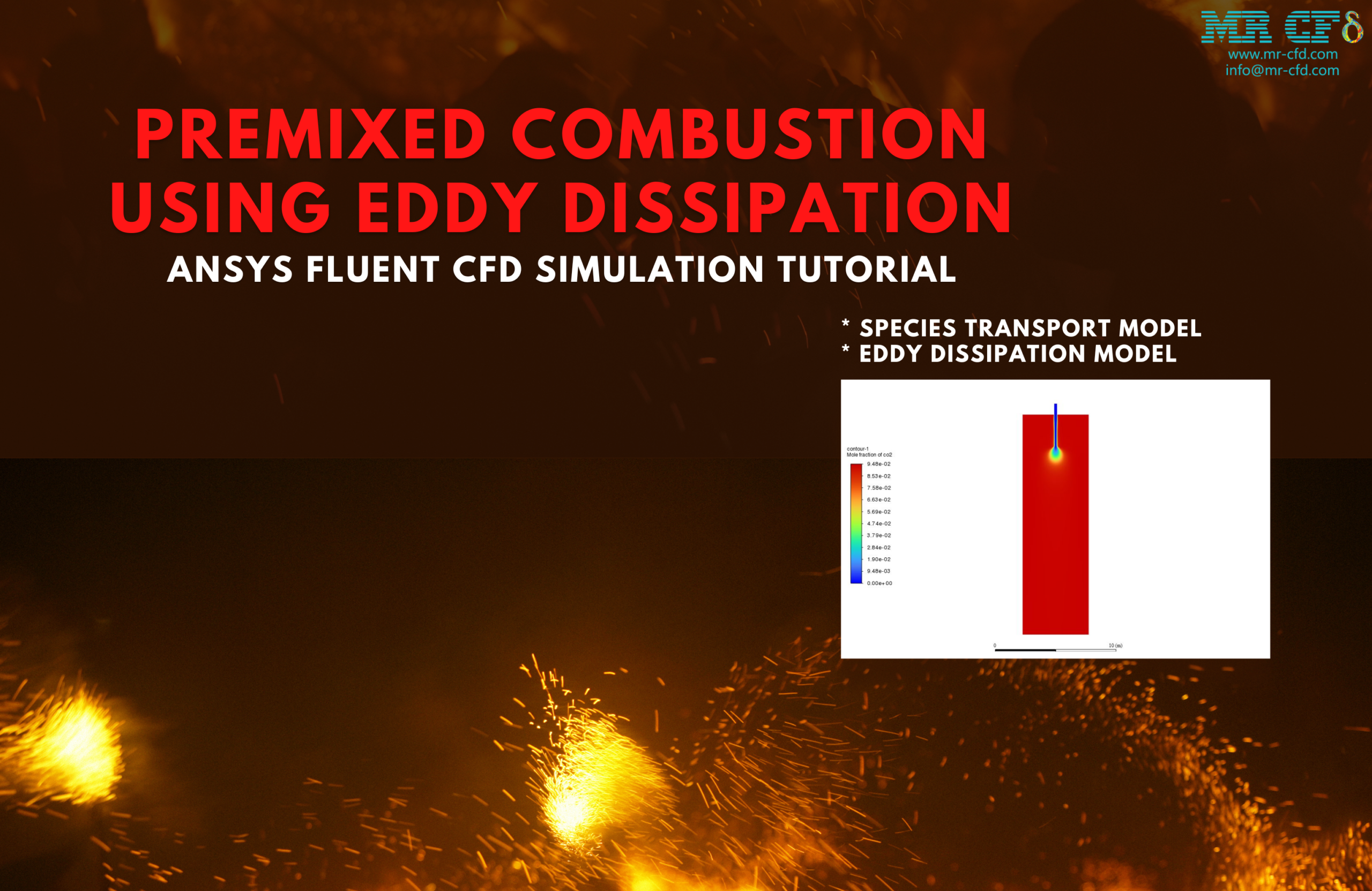
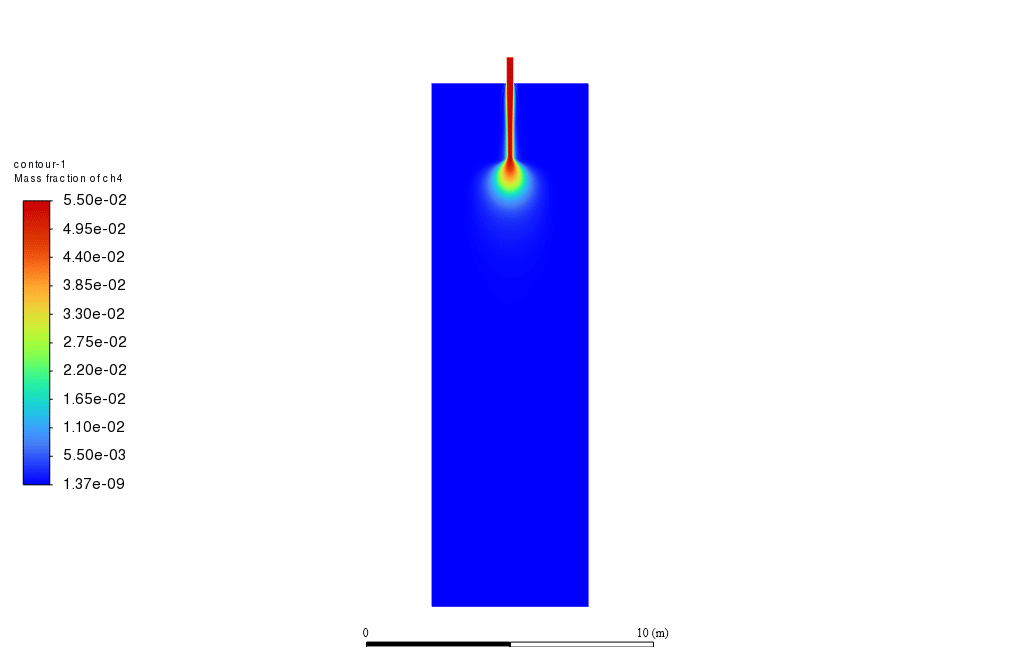
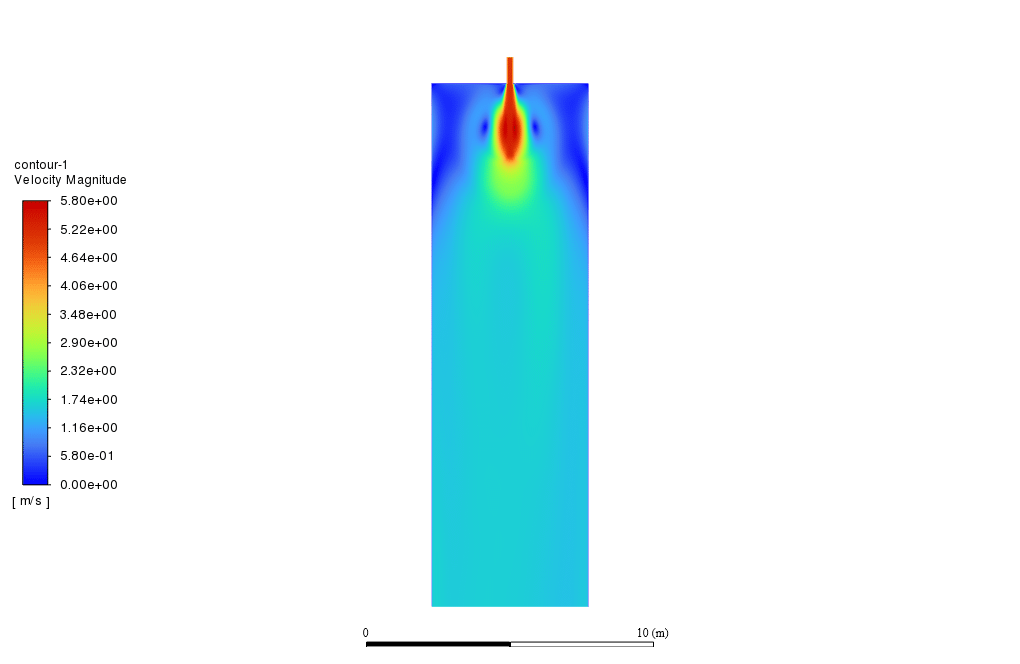


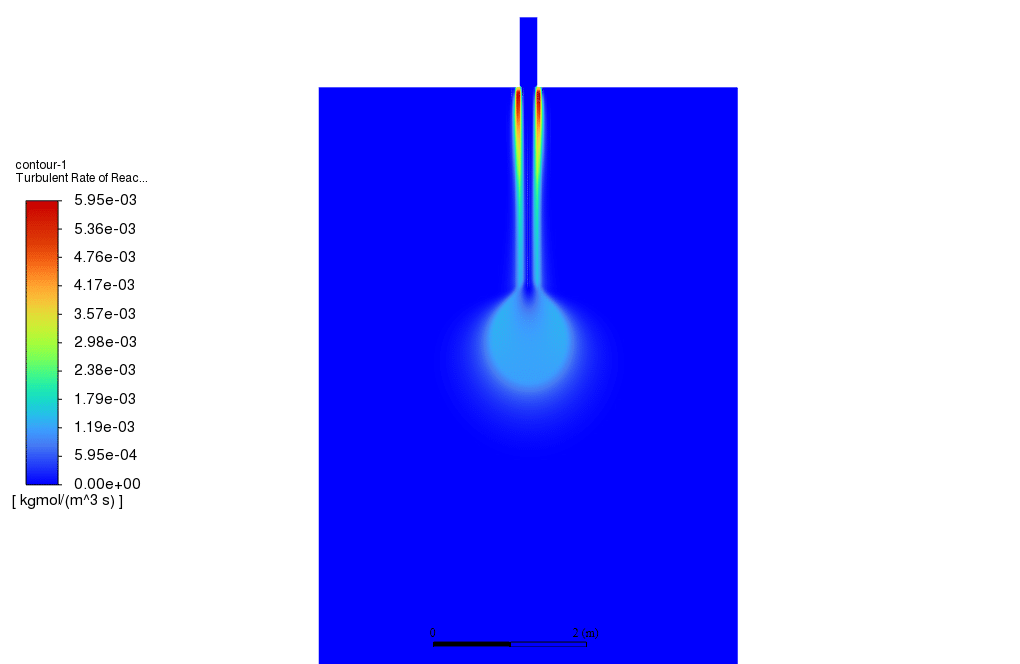
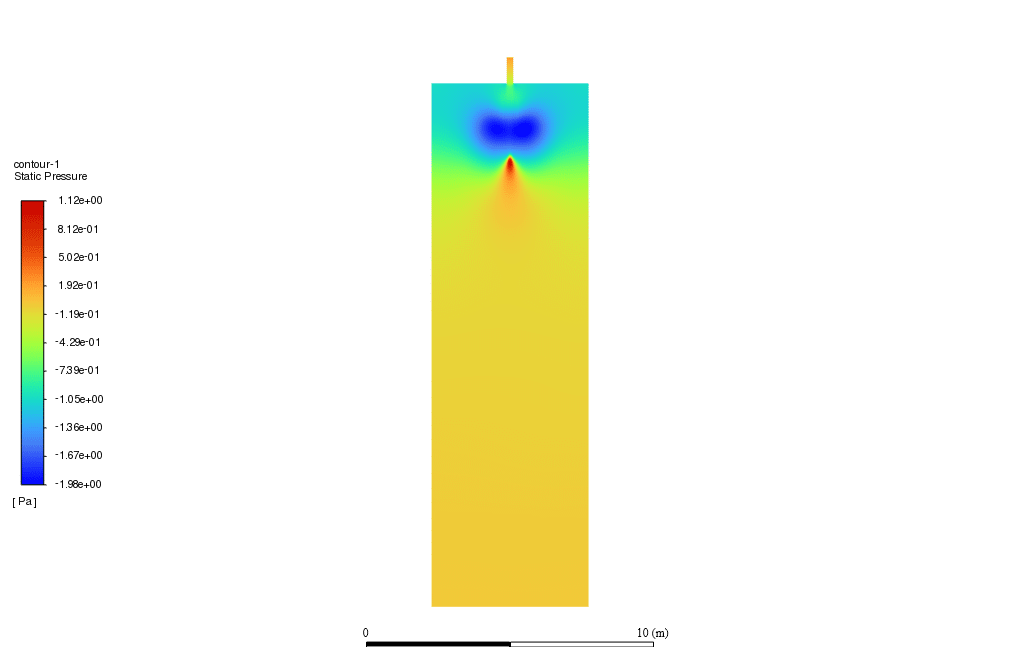

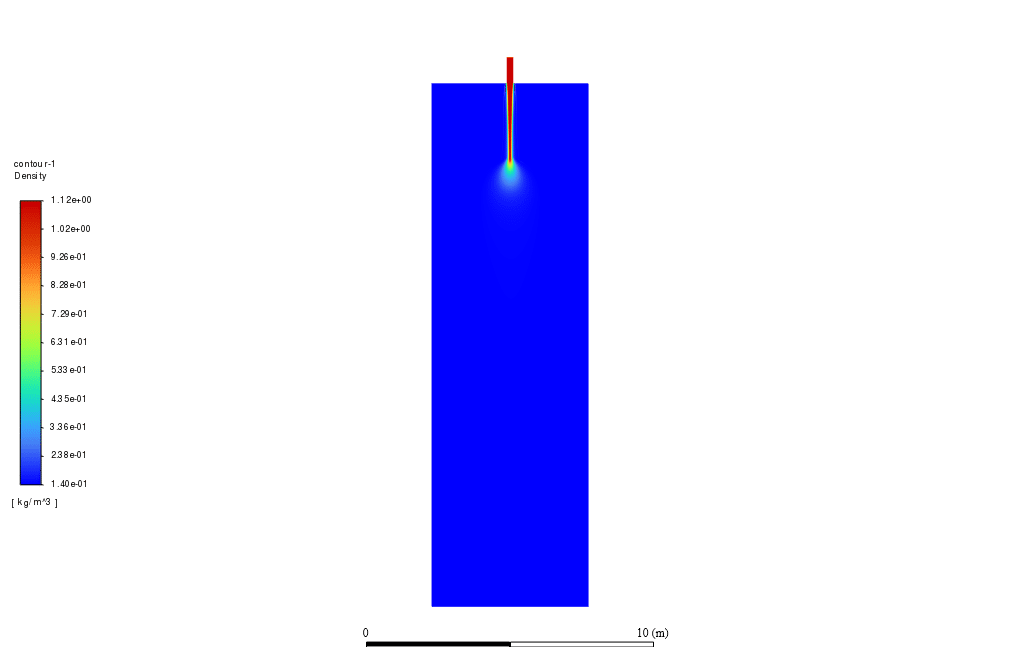

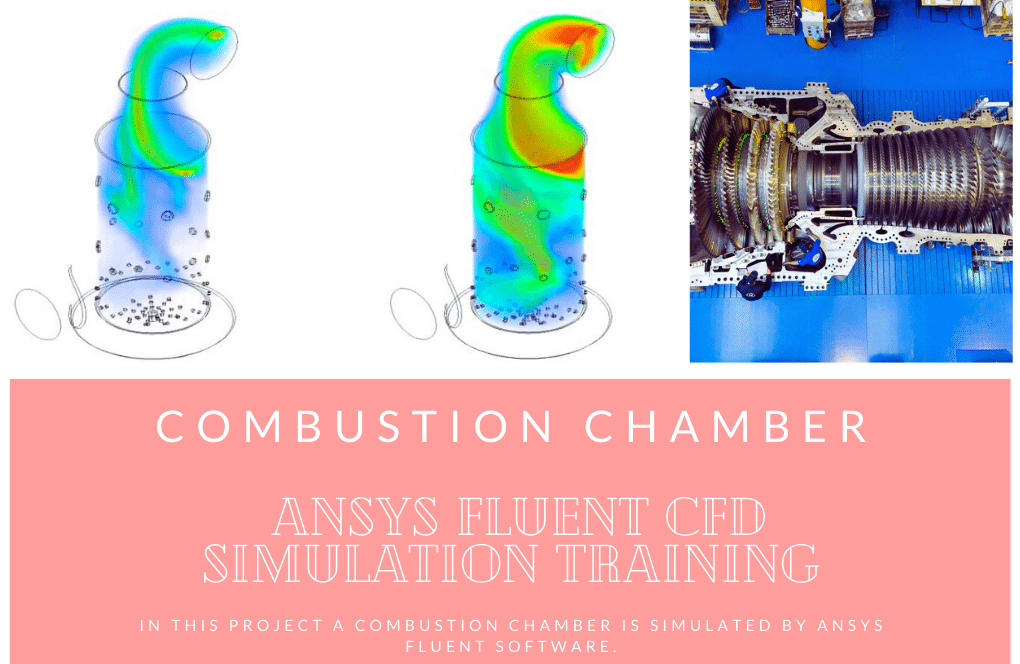



Issac Mayert –
I’m really impressed with the way the secondary flows are displayed to enhance understanding. Do these flows give a realistic perception of acceleration within the chamber?
MR CFD Support –
Thank you for your kind words! Secondarily flows are crucial in a combustion chamber as they help to promote thorough mixing of fuel and air, thereby ensuring efficient combustion. The simulation aims to provide a realistic view of the behavior of these flows and their contribution to the acceleration of particles within the combustion process. We’re glad that this aspect of the simulation was clear and insightful for you.
Mitchell Stamm –
The combination of structured mesh and the species transport model was well-explained, but I’d like to know if other turbulence models were considered for this simulation, and if so, why the k-epsilon model was chosen?
MR CFD Support –
For this particular simulation, the k-epsilon model was chosen because it provides a good balance between accuracy and computing resources for industrial applications involving combustion. Other turbulence models, such as k-omega or RNG k-epsilon, might also be suitable, but the standard k-epsilon model is well-established for a wide range of turbulent flows and is less computationally intensive, which potentially reduces the simulation time while still capturing the essential physics of the combustion process.
Rubie Beatty DVM –
I just finished going through the Premixed Combustion Eddy Dissipation CFD Simulation training, and it was incredibly insightful! The approach to premixed combustion modelling was clear, and the results were very interesting to observe, especially the temperature contours and streamlines.
MR CFD Support –
We’re so glad to hear that you found the training insightful and that the results of the simulation met your expectations. It’s fantastic to know that the temperature contours and streamline visualization added value to your understanding. Thank you for choosing our course, and if you need any further assistance or have questions, feel free to reach out!
Ms. Anastasia Rogahn Jr. –
The premixed combustion simulation sounds fascinating. Did the training also describe how to analyze the emissions produced during the combustion process?
MR CFD Support –
Yes, in addition to temperature and velocity, the training covers how to analyze different species’ mass fractions. Emissions analysis can be done by examining these mass fractions to understand the distribution of various combustion by-products in the chamber.
Ross Gerhold –
The training material did justice to explaining premixed combustion. Could you expand on what kind of combustion applications this training could be particularly insightful for?
MR CFD Support –
Thank you for your interest! This training on premixed combustion simulation can be quite beneficial for a variety of applications such as understanding the fundamental processes in spark-ignition engines, gas turbines, and household furnaces. It’s also valuable for those working on technologies for reducing emissions in combustion systems or designing more efficient burners in industrial settings.
Ozella Goldner MD –
I’ve always been fascinated by how combustion is simulated. The idea of premixed fuel and air igniting in a virtual chamber is mesmerizing! The level of detail, like accounting for conditions such as turbulence, reminds me how advanced this field has become.
MR CFD Support –
Thank you for your kind words! We’re thrilled to hear that you’re fascinated by the simulation of combustion processes. It is indeed a mesmerizing and complex field that pushes the boundaries of our computational capabilities. We’re glad our product could capture your interest and show the intricacies of premixed fuel and air combustion within a CFD environment.
Samir Mitchell IV –
The overview of this training on premixed combustion was excellent. The step-by-step approach from design to the final simulation process offered a clear understanding of using the eddy dissipation model in combustion.
MR CFD Support –
Thank you for your positive feedback! We are glad that the Premixed Combustion training was clear and informative. If you have more questions about advanced simulations or other processes, our team is ready to provide further assistance!
Beverly Prohaska –
I’m really impressed with the secondary flows increasing the mixing process in this CFD simulation! Great results!
MR CFD Support –
Thank you for your positive feedback! It’s fantastic to hear that you recognized the importance of the secondary flows and their role in enhancing the mixing and combustion process in our Premixed Combustion Eddy Dissipation CFD simulation. We strive to provide detailed and high-quality simulations, and your acknowledgment is very much appreciated.
Dr. Celestine Strosin –
I am thrilled with how thorough the Premixed Combustion CFD Simulation training is! The structured layout made the learning process straightforward and the simulations really helped me understand the principles of combustion and turbulence interaction.
MR CFD Support –
Thank you for your positive feedback! We’re delighted to hear that the training material was clear and beneficial for you. Understanding the complexities of premixed combustion is essential, and we’re glad our simulations could enhance your learning experience. If you have any further questions or need assistance with future projects, don’t hesitate to reach out! Keep learning and exploring CFD with MR CFD Company.
Mr. Conor Abshire DDS –
Is the temperature rise consistent across the entire chamber, or are there hot spots?
MR CFD Support –
In this simulation, the temperature increase is not perfectly uniform across the entire chamber. As presented in the temperature contour, there are areas with higher temperatures indicating that combustion mainly occurs in distinct zones, creating ‘hot spots.’
Brenda Emmerich –
The training course on Premixed Combustion Eddy Dissipation in ANSYS Fluent was exceptionally comprehensive. It clearly illustrates how the species transport and turbulence chemistry interactions are modeled. Observing the changes in various species’ mass fractions and temperatures throughout the chamber provided tangible insights into the combustion process. Excellent approach to demonstrating secondary flows’ roles in enhancing mixing and combustion!
MR CFD Support –
Thank you for your positive feedback on the Premixed Combustion Eddy Dissipation CFD Simulation course. We are glad you found it thorough and insightful. It’s always great to hear that our simulation approach was able to clarify complex phenomena like turbulent mixing and its impact on combustion efficiency. We appreciate your comments and hope you continue to have a great learning experience with our courses!
Edwin Bogan –
I’m amazed by the detail in the simulation results! How does the inclusion of the eddy dissipation model specifically affect the accuracy of simulation in premixed combustion cases?
MR CFD Support –
Thank you for the kind words! The eddy dissipation model in the premixed combustion simulation predominantly affects the predicted rates of reactions. It simplifies the impact of turbulence on the chemical kinetics by assuming that the reaction rate is controlled by the rate of eddy dissipation, which embodies the mixing process of reactants. This approach, while less detailed than solving full kinetic models, provides a good balance between computational resource requirement and the accuracy of capturing key features of turbulence-chemistry interactions in combustion. The model’s integration greatly contributes to correctly predicting the reaction zone’s location and overall combustion behavior.
Axel Langosh –
The breakdown of how combustion is affected by eddy dissipation would help further my understanding. Could you please clarify that part?
MR CFD Support –
In the simulation, the eddy dissipation model estimates the combustion rate based on the turbulent mixing time scale and the reactants’ concentration. Essentially, it is based on the assumption that the reaction rate is limited by the speed at which reactants are brought together by the turbulent flow, which is the mixing-controlled rate. Consequently, reactions occur only within the eddies where fuel and oxidizer concentrations are at molecularly mixed conditions. Therefore, the rate of combustion depends largely on turbulence characteristics rather than detailed chemistry mechanisms. When the combustion products move out of these fine structures, they are then governed by molecular diffusion.
Jacky Hudson I –
I’m thoroughly impressed with how the premixed combustion simulation could enhance the understanding of species transport and eddy dissipation. The details about initiating the combustion process and ensuring efficient combustion through secondary flows have been helpful. The temperature contours really highlighted the effectiveness of the setup.
MR CFD Support –
Thank you for your positive feedback! We are pleased to hear that our premixed combustion simulation met your expectations and provided you with valuable insights into the combustion process. It’s great to know that the details on species transport, eddy dissipation, and the role of secondary flows in enhancing combustion were particularly useful to you. We strive to deliver high-quality training and are glad that our efforts reflected in your experience!
Eliza Ortiz –
I was thoroughly impressed with the insightful course on premixed combustion by MR CFD. The content distribution, practical examples, and simulation process were explained in such an intuitive way that it made grasping the concepts easier. The eddy dissipation model was fascinating, and the correlation between secondary flows and enhanced combustion was remarkably well-presented.
MR CFD Support –
Thank you for your positive feedback on our Premixed Combustion CFD Simulation Course. We are delighted to hear that you found the content insightful and the concepts easy to grasp. Your appreciation of the practical examples and the details about the eddy dissipation model is very much appreciated. It’s great to know that the course has added value to your understanding. Do not hesitate to reach out if you have any questions or need further assistance. We look forward to supporting your learning journey in CFD!
Gennaro Murray –
This training course was incredibly informative! Seeing the temperature increase within the combustion chamber helped clarify how efficient mixing enhances combustion. I found the streamlining especially fascinating in demonstrating secondary flows.
MR CFD Support –
Thank you for your positive feedback! We’re delighted to hear that the course on premixed combustion using ANSYS Fluent was enlightening and that the visualizations added clarity to the concepts. It’s great to know that the efficient mixing process was well demonstrated through the simulation. We appreciate you taking the time to review our product, and we’re here if you have any further questions or need additional learning tools!
Larissa Mann –
The premixed combustion CFD simulation by the eddy dissipation method is fascinating. It is great to see how the species transport model is applied in a practical simulation context, and the structured mesh provides a clear view for accurate results. I’m impressed by the detailed approach to capture the real essence of the combustion process and the turbulence-chemistry interaction. The temperature contour must reflect the successful combustion with high precision. Well done!
MR CFD Support –
Thank you for your kind words! We’re glad to hear that you’re impressed with our approach to premixed combustion simulation using the eddy dissipation method in ANSYS Fluent. We always strive to provide clear and accurate results. If you have any questions or need further training on this or other CFD processes, don’t hesitate to reach out to us!
Lawson Gleichner –
I love how detailed and clear the explanation is for the premixed combustion simulation process. Understanding how the eddy dissipation model works along with the species transport made the concept click for me.
MR CFD Support –
Thank you! We’re so glad to hear that the information was presented clearly and helped you understand the premixed combustion simulation process better. If there’s anything more you’d like to learn about or if you have any other feedback, feel free to reach out to us!
Kamryn Adams –
I’m really impressed with the detail in the Premixed Combustion CFD Simulation project. It provided an in-depth understanding that was crucial for my research on combustion chambers. The visuals were helpful, and seeing the temperature changes and secondary flows was fascinating! Great job!
MR CFD Support –
Thank you for your positive review! We’re glad to hear the Premixed Combustion CFD Simulation project met your research needs and helped enhance your understanding of combustion chambers. Your feedback on the detailed analysis and visuals is much appreciated. If you have any more questions or need further assistance, don’t hesitate to reach out. Happy researching!
Camila Pacocha –
This tutorial seems quite comprehensive. Can you tell me if it would cater to beginners who are new to CFD simulation, especially eddy dissipation modeling?
MR CFD Support –
This tutorial serves as an episode in a combustion training course and covers advanced topics like premixed combustion using the eddy dissipation model. Beginners with a basic understanding of CFD and ANSYS Fluent would find it informative, but they may need to familiarize themselves with fundamental concepts before undertaking this specific trial.
Heidi Monahan –
The training session on pre-mixed combustion simulation was really comprehensible. I could closely follow the step-by-step process, especially the settings for the species transportation and the handling of eddy dissipation. It made the complexity of combustion processes in ANSYS Fluent much clearer!
MR CFD Support –
Thank you for your positive feedback. We’re thrilled to hear that our training on pre-mixed combustion simulation clarified complex processes and that you found the species transportation and eddy dissipation models easy to understand in the context of ANSYS Fluent. We always strive to provide clear and in-depth tutorials, and your satisfaction is very encouraging!
Dayana Wolff –
The product Premixed Combustion Eddy Dissipation CFD Simulation clearly taught me how the eddy dissipation model works with premixed combustion. I appreciate the visual aids and streamlined explanation.
MR CFD Support –
We’re thrilled to hear that you found the Premixed Combustion Eddy Dissipation CFD Simulation insightful and understandable. It’s great to know that our visual aids and explanations were helpful in your learning experience. Thank you for your positive feedback!
Letitia Schumm –
I’m thrilled with how the premixed combustion simulation turned out. The clarity of the combustion process and the details captured in the species transport are impressive. It was particularly fascinating to see how the secondary flows influence the mixing and combustion processes.
MR CFD Support –
Thank you for your kind words! We’re delighted to hear that our simulation met your expectations and provided clear insights into the premixed combustion process. Seeing the combustion come to life through our simulation and the effects of secondary flows on mixing and combustion is something we aim to achieve for our users to understand the complex phenomena accurately. Your feedback is much appreciated!
Dr. Mikel Dare –
I am very impressed by how you handled premixed combustion! Do you also offer any other topics for training in the field of combustion simulation using ANSYS Fluent?
MR CFD Support –
Thank you for your kind words! Yes, we offer a wide range of topics for training in the field of combustion simulations using ANSYS Fluent beyond premixed combustion. You can explore various episodes in our Combustion Training Course, where each session delves into different aspects and models of combustion analysis.
Nyah Blick II –
The training course sounds detailed! Was there an improvement in combustion efficiency due to the secondary flows created within the chamber? I’m curious about how these patterns in flow can influence the overall process.
MR CFD Support –
As an admin, I cannot provide real-time feedback since I don’t have the data post simulation. However, typically, the secondary flows are beneficial as they enhance the mixing of the fuel and air, leading to more uniform combustion and potentially increasing efficiency. In simulations like these, the detailed results and analysis would explain exactly how much efficiency is gained through such flow patterns.
Melvina Altenwerth –
I’m truly impressed by how well the species transport model and eddy dissipation account for premixed combustion and turbulence within the chamber. The attention to detail in the temperature and velocity contours provides a deeper understanding of the combustion dynamics.
MR CFD Support –
Thank you for your kind feedback! We’re pleased to hear you appreciated the detail and accuracy of our premixed combustion simulation. Our goal is to provide insightful views into complex processes to enhance learning and understanding. If you have any more questions or require further learning materials, do not hesitate to reach out!
Schuyler Yundt –
I’m really impressed by the detailed analysis that the simulation provides. It must be an incredible tool for understanding the intricacies of combustion processes in chambers!
MR CFD Support –
Thank you for your kind words! We are thrilled to hear that our simulation on premixed combustion in a combustion chamber has impressed you. Understanding such intricate processes is exactly what our simulations aim to achieve. Your feedback is greatly appreciated and motivates us to continue delivering high-quality CFD training!
Rene Crooks II –
The species transport model has been truly intriguing to work with. I appreciate how the methane-air mixture was handled and how the combustion modeling in the chamber was detailed. The structured mesh also lent itself well to ensuring accurate results. After assessing the visual outputs like temperature contours and streamlines, it is evident the simulation captures the strengths of the eddy dissipation model approach to premixed combustion. Fantastic work by MR CFD!
MR CFD Support –
Thank you for your kind words and positive feedback! We’re delighted to hear that our simulation met your expectations and you found the visual outputs informative. It’s great that you appreciate the complexity and the details incorporated into our species transport model. Should you have any further queries or require additional assistance regarding our products, please don’t hesitate to reach out.
Ms. Nella Gottlieb –
The provided training on Premixed Combustion using the eddy dissipation model in ANSYS Fluent has greatly enhanced my understanding of the combustion processes in a structured and layered manner. Kudos to the team for making complex subjects like turbulence and species transport in combustion so engaging and easier to grasp!
MR CFD Support –
Thank you for your kind words! We’re delighted to hear that our Premixed Combustion training has clarified complex concepts for you. Our goal is always to deliver educational materials that are both informative and engaging. We appreciate your feedback and are here to support your continued learning in CFD with our ANSYS Fluent courses.
Rhianna Lueilwitz –
The premixed combustion simulation scenario with eddy dissipation clearly presents complex interactions between turbulence and chemical kinetics. Could you elaborate on how this model is advantageous for simulating a realistic combustion chamber?
MR CFD Support –
The use of the eddy dissipation model is advantageous for simulating realistic combustion chambers because it simplifies the chemistry of turbulent premixed flames. It assumes that the rate of combustion is controlled by the rate of mixing rather than by the rate of chemical reaction. This assumption significantly reduces computational costs while still providing reasonable accuracy for the temperature and species concentration predictions within the combustion chamber.
Sigurd McClure –
The training material was outstanding! It thoroughly covered the principles of premixed combustion and species transport, especially how the eddy dissipation model simplifies the complex chemistry of such processes. Great job!
MR CFD Support –
Thank you for your positive feedback! We’re delighted to hear that our training material on premixed combustion was helpful for you. If you have any more questions or need further assistance, feel free to reach out.
Daisy Kautzer –
This premixed combustion simulation sounds comprehensive. Did you find the streamline and species mass fraction results validated the design of the combustion chamber for efficient mixing?
MR CFD Support –
Thank you for your appreciation of our premixed combustion simulation training material. We’re glad that the results resonated with you in assessing the efficiency of mixing processes within the combustion chamber. If you have further questions or require more detailed analysis, please feel free to reach out!
Prof. Rolando Kulas –
I am thrilled with how the simulation depicts the combustion process with such clarity. The inclusion of temperature contours and streamline representation provides an in-depth understanding of the phenomena occurring inside the combustion chamber.
MR CFD Support –
Thank you for taking the time to give your positive feedback! We’re pleased to know that the simulation met your expectations and provided a detailed insight into the combustion process. If you have any further questions or require more assistance, feel free to reach out.
Mr. Bobbie Auer –
I followed the detailed instructions for the premixed combustion simulation and was impressed by how succinctly the tutorial managed to simplify the complex interactions within a combustion chamber. The visuals were particularly helpful!
MR CFD Support –
Thank you for your positive review! We’re delighted to hear that our premixed combustion simulation tutorial was clear and the accompanying visuals aided your understanding. If you have any further questions or need more assistance, feel free to reach out.
Dedric Blick –
The tutorial for Premixed Combustion Eddy Dissipation CFD Simulation was so clear and informative. I finally got my simulation to work correctly. Thank you for the excellent course material and set-up instructions!
MR CFD Support –
Thank you for your wonderful feedback! We are very pleased to hear that our course material for the Premixed Combustion Eddy Dissipation CFD Simulation helped make your simulation work correctly. Keep up the great work with your simulations, and don’t hesitate to reach out if you need further assistance in future projects!
Tania Olson –
The training for the Premixed Combustion Eddy Dissipation CFD Simulation helped me understand the combustion process more clearly. The visualization of temperature contours and streamlines was particularly insightful. Great work!
MR CFD Support –
It’s fantastic to hear that the Premixed Combustion Eddy Dissipation CFD Simulation was helpful in deepening your understanding of combustion processes and that the visualizations enhanced your learning experience. We strive to provide clear and insightful training materials. Thank you for the positive feedback!